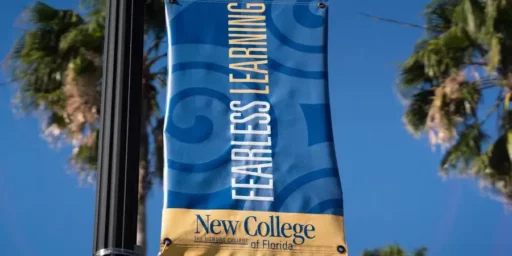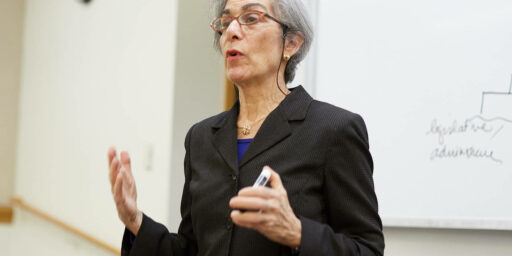College Sports Scandal Blame Games
Margaret Soltan is no fan of college sports and her diatribes on the subject can be condescending and annoying. But she makes a good point here about the fact that those who enable cheating never seem to get much attention:
Everybody notices the crooked defiant coach, the hapless sputtering president, the anonymous guys on the academic support staff who sit next to the players as they take the online quizzes and tell them what the answers are — but the professors who make the courses… who police the department for evidence of academic integrity…
These guys are the brains behind the operation! Lose the whore in Human Development and the stooge in Sociology, and game’s off, people. And yet “the public face,” as the New York Times puts it, of SUNY’s scandal is Sally Dear, a mere adjunct in Chair Leo Wilton’s department.
UD understands that you need whores up and down the line to produce outcomes like Binghamton’s and Auburn’s. Without “see no evil apologists” like Donna Shalala (who may be about to hire the most disgraced medical school professor in the country to run her school’s psychiatry department), the University of Miami couldn’t field what was recently the most violent team in university football; without national embarrassment T.K. Wetherell running it, Florida State couldn’t produce the biggest sports cheating scandal in the country, etc. But why overlook the tenured department chairs who use their curricular and hiring powers to turn large academic units into national laughingstocks?
Indeed, you’d think professors and department heads would get in especial trouble given that their mission is theoretically unclouded, whereas college presidents and athletic directors have terrific pressure to win at all costs.
Of course, if the system won’t even punish serial cheaters like John Calipari — who get caught cheating, leave their programs in shambles, and then move on unscathed to do the same elsewhere for more money — then it seems silly to bother with the small fish.






Dept. chairs are tenured, but an administration still has different ways to put pressure on a chair.
Also, I think you can perhaps fault some faculty for being cynical, or bowing to easily to pressure, or not being brave enough, but in general, they are not happy about things. For example, the Binghamton faculty voted against going to Division I.
The NCAA really needs to drop the pretense that these guys are amateurs and just let colleges pay their players, and who cares if they go to class or not. If some booster at USC or Ohio State or Florida wants to pony up $1 million to pay the #1 HS QB to come to their school, why not? Why should the NFL and NBA get a free farm system? And what’s the downside with that?
I don’t agree with that but do think stipends for athletes working 20-40 hours a weeks generating revenue for the school should be paid.
The problem is that, with Title IX, you wind up having to pay the women’s lacrosse team that draws 17 people to the stands the same stipend as the quarterback who brings in millions of dollars. Which makes all this a non-starter.
I’m not sure Title IX works that way, but it’s been a looong time since I looked how it operates. For example, the football team gets pep rallies, chartered jets to away games depending on where, stays at a nice hotel even the night before home games (at least at my school), better training facilities, etc. etc. etc. Not sure why actually paying the players would be different (as opposed to providing equivalent opportunities for females to participate in inter-collegiate sports, which is IIRC what Title IX is all about).
Further, if the $$ comes directly from boosters to the student-athletes, I’m not sure Title IX comes into play at all (though I’m sure the schools would rather control who gets paid what, which is probably part of the reason why the NCAA is sticking to the amateur fiction).
In any event, Title IX aside, I still don’t understand why these schools get to rake in millions of dollars on the backs of adults who, at best, get paid the equivalent of $40,000-$50,000 a year in kind (tuition, room, board, etc. at, say, Duke) when, if there was a true free market for their services, some of them would be reaping 7 figure salaries (or at a minimum 6 figure).
The schools are not generally making money off the games. The coaches and administrators, well that’s a different story. But in fact, most of the money the athletic departments do make on football and basketball is used to pay for all those non-revenue producing sports. If you start taking from money from those revenues to pay the football or basketball players, then you are going to lose more sports, perhaps even women’s lacrosse.
The schools are not generally making money off the games. The coaches and administrators, well that’s a different story. But in fact, most of the money the athletic departments do make on football and basketball is used to pay for all those non-revenue producing sports. If you start taking from money from those revenues to pay the football or basketball players, then you are going to lose more sports, perhaps even women’s lacrosse.
It takes special talent to double post these days.
So not only is college sports corrupt those in the Ivory Tower are corrupt as well. Who pays for that corruption? The real students who are seeking an education and their parents who are paying for it.
Thanks Modern Academia, thanks for nothing.